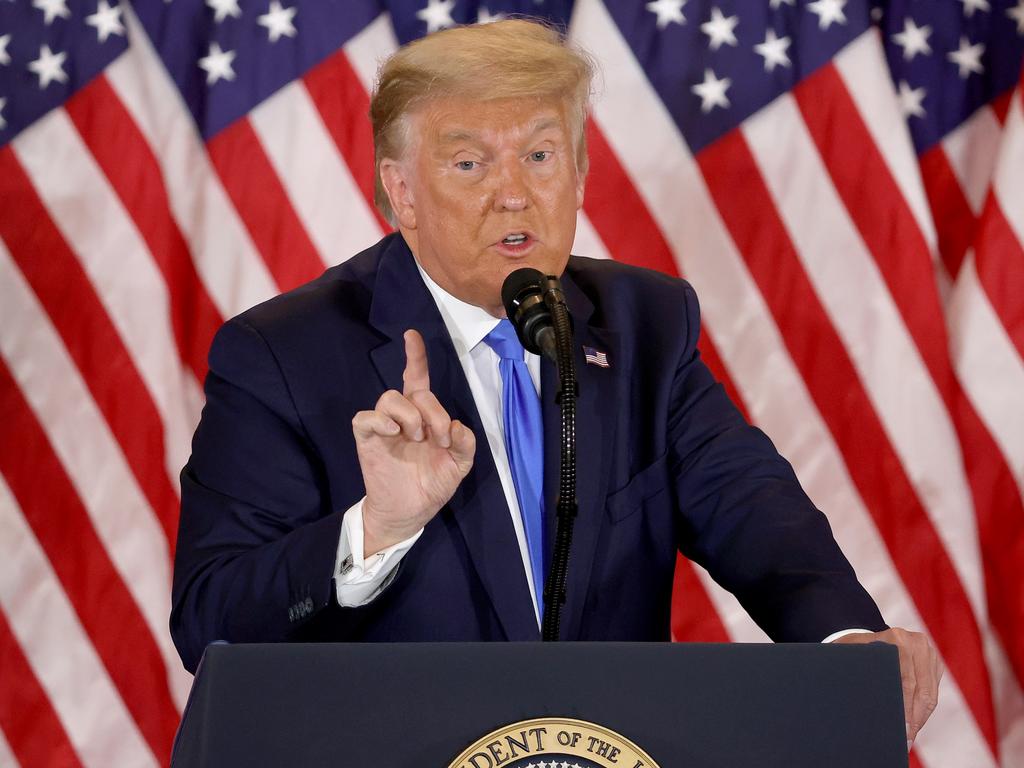There’s a strategy behind Trump’s sulking
If Donald Trump sows enough doubt about Joe Biden’s election, he can stand again in 2024 as the man who never really lost.

Electoral fraud is part of American folklore. From the earliest days of the republic, allegations of ballot stuffing, voter suppression and the rich tradition of dead men voting have been a routine feature of close elections.
Brendan Byrne, the famed governor of New Jersey, a state notorious for eye-catching results over the years, once quipped, “When I die I want to be buried in Hudson county so I can remain active in Democratic politics.”
So the suggestion that last week’s results, registering the decisions of close to 160 million people, might include a number of ballots that wouldn’t pass a casual smell test shouldn’t come as a surprise. Almost half the country voted by mail and despite assurances that mail-in balloting is no less safe than in-person voting, it is self-evidently more subject to fraud or simple error.
But it’s also true that evidence of fraud has rarely been on a scale large enough to have changed an election outcome. Republican legend has it that Richard Nixon was cheated out of victory in 1960 because of a suspiciously huge vote for John F Kennedy in Cook county, Illinois, home to the Chicago Democratic machine. But Kennedy could have lost Illinois and still won that election.
Yet when the inevitable vagaries of imperfect electoral processes combine with the introduction of mass mail-in voting and it all results in an apparently narrow defeat for the most narcissistic and pugnacious president in modern history, you can expect trouble.
It is almost a week since the election returns handed a small but solid majority to Joe Biden, and Donald Trump still hasn’t conceded. The president’s refusal to defer to the president-elect has produced the usual five-alarm fire for the world’s media. It’s hard to resist the sense that for four years they’ve actually been hoping for this: some final confirmation that until now has eluded them that Mr Trump is indeed about to overthrow the institutions of American democracy and install himself as dictator.

They’re likely to be disappointed again. It may be - it is - sulky, undignified and unbecoming of a defeated incumbent to refuse to concede until he has exhausted all legal avenues, but it doesn’t represent or prefigure a coup.
In so far as there is method to the president’s truculence, as opposed to more of the usual instinctive, boundless self-regard, it rests on two aims. The first is an implausible long shot to change the electoral outcome. Though Mr Biden won a big majority in the popular vote, his victory in the electoral college was thin, resting on a small number of votes in critical states that put him over the 270 needed for victory.
In fact the results appear to mirror almost precisely Mr Trump’s own win over Hillary Clinton in 2016 (which he has repeatedly called a landslide). Mr Biden looks set to end up with 306 electoral college votes to Mr Trump’s 232, flipping precisely the parties’ totals from 2016.
Mr Trump won then thanks to a total margin of 77,000 votes - 0.5 per cent - in three states that combined to give him his electoral college victory: Pennsylvania, Wisconsin and Michigan. In 2020 Mr Biden seems to have secured a combined margin of just under 50,000 votes, or 0.4 per cent, in three states that gave him the edge: Arizona, Georgia and Wisconsin.
The first aim of the Trump campaign is to use the law to overturn state poll results. There’s an infinitesimal chance that court decisions will throw out enough ballots to close the gap. A few hundred votes might be shown to be problematic, not the tens of thousands needed.
Instead the hope is to use the law and political conditions in the three states to achieve this end in another manner. Under US law, state legislatures run elections and they are responsible for submitting lists of voters for a candidate to the electoral college. For the past century, almost all states have simply submitted the electoral votes in line with the way the state’s population voted.
The Trump campaign hopes to make enough of a stink about alleged fraud that state legislatures could refuse to use the popular vote outcomes and submit instead slates of electors of their own choosing. As it happens, Arizona, Georgia and Wisconsin all have state legislatures controlled by Republicans. In the fever dreams of the president’s more imaginative lawyers, perhaps these states will deliver. That’s improbable in the extreme, but that’s where the second, more plausible Trumpian objective comes in. By sowing enough doubt in the minds of Republicans about the election, Mr Trump hopes to claim a moral victory. He was ousted only by fraud. He can refuse to co-operate with a Biden transition, sit out the new president’s inauguration, set himself up as a candidate for 2024. The Undefeated. This second objective already seems to be on the way to being achieved.
All this, however, while perfectly legal and politically satisfying, is deeply dismaying. Republicans have a point when they say their opponents and a hostile media essentially refused to accept the result of the 2016 election, insisting falsely it was all because of Russian interference, and spending the next four years delegitimising a duly elected president.
But it’s precisely because faith in the system has been so undermined that Republicans especially should step up and affirm that, for all its flaws, American democracy still functions. Not, perhaps, out of some act of political altruism, but because if it really doesn’t function, it’s hard to see how Republicans, or America as a democracy, could ever truly succeed again.
The Times








To join the conversation, please log in. Don't have an account? Register
Join the conversation, you are commenting as Logout